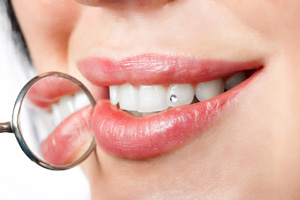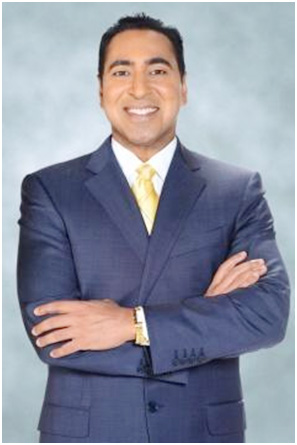Why Health and Fitness Month Should Include Your Mouth
Author by Dr. Arun K. Garg

Why Health and Fitness Month Should Include Your Mouth:
Tips and Tricks to Live up to Your New Year’s Resolution
By Arun K. Garg, DMD
One month down, 11 to go. At several weeks old, 2015 has barely been run through its paces and the next Times Square ball drop feels like an eternity in the distance.
While the year may still retain its freshness, chances are our New Year’s resolutions you know, those pesky declarations we made to ourselves and our loved ones only a few weeks back, resolving to transform our lives are beginning to feel a little stale. Many of us declared we’d swear off alcohol, get in shape, lose weight, listen more, and generally resolve to become better people. The question is, how many of us resolved to improve our oral health? Very likely this is a resolution that wasn’t even considered. But it should have.
That’s because a patient’s oral health is an important indicator for their overall well-being. And very often, failing to maintain one’s oral health can lead to a variety of physical and psychological problems, ranging from mild pain from a neglected cavity or self consciousness when smiling, up to and including lost teeth, excruciating pain that radiates from the jaw, bad breath, malnutrition, and severe anti-social tendencies that undermine a person’s confidence and self-esteem. Taken cumulatively, the combination of these challenges can stunt a person’s professional and personal potential for decades to come.
 The Cost of Deferred Maintenance Adds Up
The Cost of Deferred Maintenance Adds Up
Poor oral health can also have a crushing impact on a patient’s wallet. Americans spend around $100 billion on their oral care annually. Of that figure, about $2 billion is spent on toothpaste and $775 million on toothbrushes. While these figures may sound impressive, they really aren’t after you crunch the numbers. Per capita, the annual figure is closer to $315 per year. These statistics paint an interesting picture. While some Americans are spending money maintaining their oral health, millions of others are greatly neglecting this most basic task. It isn’t rocket science to conclude the obvious: neglected issues become magnified, costlier problems over time. That’s true whether we’re talking about repairing potholes in the spring versus letting an entire roadbed fail, or if we’re talking about filling cavities or performing tooth extractions before infection spreads.
 And like a collapsed road whose failure presents multiple impacts beyond the initial problem, poor oral health has repeatedly been linked to an increased risk of heart disease, which can ultimately lead to a heart attack. This risk is even more acute in winter when heavy snowfalls, especially in northern and mountain states, require manual shoveling – a physical activity which cardiologists tell us is one of the most taxing on the heart. Throw in some dangerous mouth bacteria that have reached the pericardium (the double walled sac that contains the heart) and it begins to feel like you’re playing Russian roulette with your life.
And like a collapsed road whose failure presents multiple impacts beyond the initial problem, poor oral health has repeatedly been linked to an increased risk of heart disease, which can ultimately lead to a heart attack. This risk is even more acute in winter when heavy snowfalls, especially in northern and mountain states, require manual shoveling – a physical activity which cardiologists tell us is one of the most taxing on the heart. Throw in some dangerous mouth bacteria that have reached the pericardium (the double walled sac that contains the heart) and it begins to feel like you’re playing Russian roulette with your life.
The bottom line: New Year’s resolutions aren’t easy. If they were, we wouldn’t need to make them in the first place. But there’s a right way and a wrong way to make sure they stick. Key to success is starting small and setting realistic goals and expectations. Improved oral care can begin with something as simple as extending the time you brush by one or two minutes and adding nighttime brushing. If you have children, review their own oral hygiene habits and consider making the improvement a family activity, with children checking on the progress of their parents and vice versa. New behaviors usually take about five weeks to become ritualized. After you’ve begun brushing more, start flossing at least once a day and using mouthwash. And if you don’t visit the dentist at least once a year, make your first 2015 appointment after you’re done reading this article.
As you resolve to transition your New Year’s resolutions from unwanted chores into welcomed habits, don’t forget the importance of your oral health. February, after all, is Health and Fitness Month; so start getting your mouth healthy today. Your mind, body and wallet will thank you that you did.
 About Author
About Author
Dr. Arun K. Garg, a South Florida dental implantologist and lecturer, is a nationally recognized dental educator and surgeon. For over 20 years, he served as a full-time Professor of Surgery in the Division of Oral and Maxillofacial Surgery and as Director of Residency Training at the University of Miami Leonard M. Miller School of Medicine. Dr. Garg is considered the world’s preeminent authority on bone biology, bone harvesting and bone grafting for dental implant surgery and has written and published nine books and a dental implant marketing kit. Dr. Garg earned his engineering and dental degrees from the University of Florida and completed his residency training at the University of Miami Jackson Memorial Hospital. He is also the founder of Implant Seminars, a leading dental continuing education company that offers a variety of class-based, hands-on, and live patient programs in the United States and abroad. Dr. Garg operates three South Florida dental clinics in Aventura, Pembroke Pines, and Hallandale Beach.































